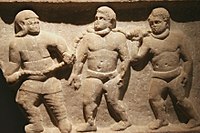
Photo from wikipedia
Online discussion platforms provide a forum to strengthen and propagate belief in misinformed conspiracy theories. Yet, they also offer avenues for conspiracy theorists to express their doubts and experiences of… Click to show full abstract
Online discussion platforms provide a forum to strengthen and propagate belief in misinformed conspiracy theories. Yet, they also offer avenues for conspiracy theorists to express their doubts and experiences of cognitive dissonance. Such expressions of dissonance may shed light on who abandons misguided beliefs and under what circumstances. This paper characterizes self-disclosures of dissonance about QAnon-a conspiracy theory initiated by a mysterious leader "Q" and popularized by their followers ?anons"-in conspiratorial subreddits. To understand what dissonance and disbelief mean within conspiracy communities, we first characterize their social imaginaries-a broad understanding of how people collectively imagine their social existence. Focusing on 2K posts from two image boards, 4chan and 8chan, and 1.2 M comments and posts from 12 subreddits dedicated to QAnon, we adopt a mixed-methods approach to uncover the symbolic language representing the movement,expectations,practices,heroes and foes of the QAnon community. We use these social imaginaries to create a computational framework for distinguishing belief and dissonance from general discussion about QAnon, surfacing in the 1.2M comments. We investigate the dissonant comments to characterize the dissonance expressed along QAnon social imaginaries. Further, analyzing user engagement with QAnon conspiracy subreddits, we find that self-disclosures of dissonance correlate with a significant decrease in user contributions and ultimately with their departure from the community. Our work offers a systematic framework for uncovering the dimensions and coded language related to QAnon social imaginaries and can serve as a toolbox for studying other conspiracy theories across different platforms. We also contribute a computational framework for identifying dissonance self-disclosures and measuring the changes in user engagement surrounding dissonance. Our work provide insights into designing dissonance based interventions that can potentially dissuade conspiracists from engaging in online conspiracy discussion communities.
Journal Title: Proceedings of the ACM on Human-Computer Interaction
Year Published: 2021
Link to full text (if available)
Share on Social Media: Sign Up to like & get
recommendations!